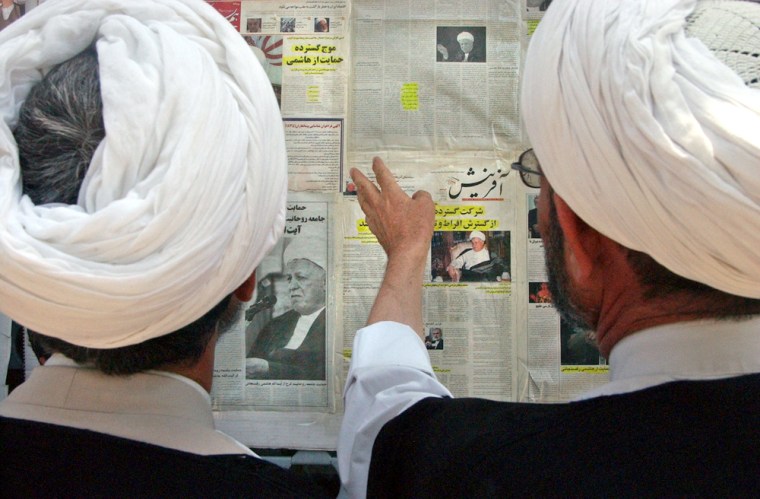Iran's first runoff race for president was shaping up as a slugfest Monday as reformists lined up behind a front-running pragmatic statesman and Islamic clerics who back Tehran's hard-line mayor halted publication of a liberal newspaper.
Following complaints of fraud in Friday's first round, the supervisory Guardian Council agreed to a recount of a random sample of 80 ballot boxes from the provinces of Tehran, Qom, Mashhad and Isfahan — a tiny portion of Iran's 42,000 polling stations.
But state TV reported later Monday that the council pronounced the results final, launching the two leading vote-getters on the hustings for the runoff ballot this Friday.
Moderate parties and liberal students offered support to Ayatollah Hashemi Rafsanjani, a former president who has veered between the strict religious and reformist camps during his career. Reformers said they had to defeat his opponent, the unabashedly hard-line Tehran mayor, Mahdi Ahmadinejad.
The liberals' move was in sharp contrast to last week when they demonstrated in Tehran calling for a boycott of the presidential vote, saying the election would not lessen control by clerics.
The boycott appeared to have an effect. Turnout was below 50 percent in Tehran, compared with 63 percent nationwide, and Ahmedinejad topped the polls in the capital.
Surprisingly close vote
Iranian analysts, who were stunned by Ahmadinejad's finishing barely behind Rafsanjani, said the runoff was too close to call. Rafsanjani, the president in 1989-97, won just 21 percent of the votes, while Ahmadinejad got nearly 19.5 percent.
Ahmadinejad's camp expressed optimism.
"We will win the runoff," said Naser Qomian, a close aide to the mayor. "Iranians have felt Ahmadinejad in their hearts. Iranians are fed up with Rafsanjani, who did little to improve the life of the poor."
Rafsanjani picked up support from two major reform parties — the Executive of Construction Party, led by the brother of outgoing President Mohammad Khatami, and the Islamic Revolution Mujahedeen Organization.
Student leader Sajjad Ghoroghi said reformist students would send activists across the country to campaign against Ahmadinejad. "We will be fighting hard across the country to defeat him," he said.
Rigged results?
Accusations of vote rigging in the first round lingered.
Mahdi Karroubi, a former parliament speaker who finished third, just two-tenths of a point behind Ahmadinejad, accused the Revolutionary Guard of strong-arming voters and rigging the results in at least four provinces.
On Monday, Karroubi resigned as an adviser to Iran's supreme leader, Ayatollah Ali Khamenei. In a letter, he urged Khamenei to investigate allegations of vote-rigging and guarantee the Revolutionary Guards do not interfere in the runoff.
"I request you to intervene and stop some parts of the Revolutionary Guard and some officials of illegally intervening in the elections. Do not let a new bitter experience be added to old ones," Karroubi said in his letter.
The reformist newspaper Eqbal intended to print the letter Monday, but the cleric-controlled judiciary blocked publication. Senior editor Karim Arqandehpour told The Associated Press he suspected it was because of the letter.
"The judicial order says our paper has to be closed down on charges of publishing false materials, spreading rumors, inciting public opinion, creating crisis and disturbing order," Arqandehpour said.
In the past five years about 100 pro-democracy publications have been shut down by the judiciary, whose leader is appointed by Khamenei.
